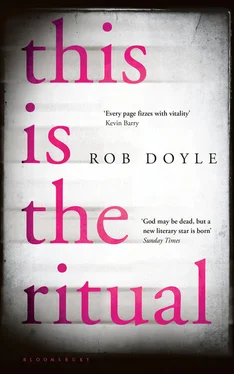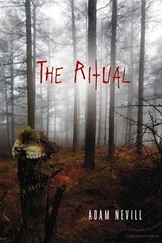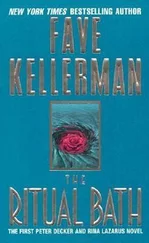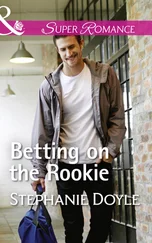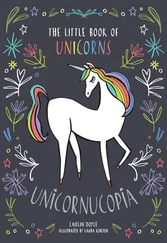Rob Doyle - This is the Ritual
Здесь есть возможность читать онлайн «Rob Doyle - This is the Ritual» весь текст электронной книги совершенно бесплатно (целиком полную версию без сокращений). В некоторых случаях можно слушать аудио, скачать через торрент в формате fb2 и присутствует краткое содержание. Год выпуска: 2016, Издательство: Bloomsbury Publishing, Жанр: Современная проза, на английском языке. Описание произведения, (предисловие) а так же отзывы посетителей доступны на портале библиотеки ЛибКат.
- Название:This is the Ritual
- Автор:
- Издательство:Bloomsbury Publishing
- Жанр:
- Год:2016
- ISBN:нет данных
- Рейтинг книги:5 / 5. Голосов: 1
-
Избранное:Добавить в избранное
- Отзывы:
-
Ваша оценка:
- 100
- 1
- 2
- 3
- 4
- 5
This is the Ritual: краткое содержание, описание и аннотация
Предлагаем к чтению аннотацию, описание, краткое содержание или предисловие (зависит от того, что написал сам автор книги «This is the Ritual»). Если вы не нашли необходимую информацию о книге — напишите в комментариях, мы постараемся отыскать её.
This is the Ritual — читать онлайн бесплатно полную книгу (весь текст) целиком
Ниже представлен текст книги, разбитый по страницам. Система сохранения места последней прочитанной страницы, позволяет с удобством читать онлайн бесплатно книгу «This is the Ritual», без необходимости каждый раз заново искать на чём Вы остановились. Поставьте закладку, и сможете в любой момент перейти на страницу, на которой закончили чтение.
Интервал:
Закладка:
As a consequence of turning thirty and feeling the shadow of my own death fall on me for the first time, I looked in the mirror and said firmly that there was no more time to waste, death had my scent now and I needed to be absolutely ruthless and focused on what I wanted to achieve, which was to write a book about Nietzsche. This newfound sense of urgency at first seemed like a valuable asset and a consolation for the loss of my youth. Before long, however, I realised that it had the effect of inhibiting me from doing what I wanted, from doing anything at all. The sense of urgency was so strong it became indistinguishable from the most crippling anxiety. I was unable to get down to anything other than worry about the hurtling of time and the blooming fortunes of my peers, most of whom had not squandered their twenties in a fog of drink, drugs, obsessive reading and pointless travel, as I had.
Seized by anxiety, I lost the ability to concentrate, or what little I’d had of it to begin with. I was like an empty can, blown all over the place. Though I had spent my life doing little apart from reading — doing little so that I could read — it struck me as a wild presumption and madness to begin writing a book on Nietzsche without having read in their entirety certain other nineteenth-century authors who, although having no direct bearing on Nietzsche, nonetheless constituted the deep background for any serious intellectual endeavour involving a subject from that era. I thought about all the significant nineteenth-century books I still hadn’t read — books which were invariably long and demanding — and the sheer scale of the task inhibited me from reading even one of them. Weeks passed and I read nothing. I just watched YouTube videos or loitered on Twitter, where I saw writers five years younger than me announce the publication of their new books. A few times, unable to bear the internet any longer, I shut down my laptop, took a breath, and actually launched myself into some or other dusty volume. ‘This is it,’ I would tell myself. ‘The anxiety is clearing. A new phase commences, the crisis has passed.’ By the time I’d reached page five, though, I’d have the niggling sense that I was reading the wrong nineteenth-century author, wasting my time on a dispens-able book during a period of great urgency. I shouldn’t be reading Fichte (say) but von Hartmann, not Weber but Spencer. By page ten or fifteen, this niggling sense would rise to an intolerable howling in my skull. Fighting off panic, I would put away Fichte and switch to von Hartmann — only to quickly feel that I should really be reading Stendhal, or Comte, or whoever. By the end of the day I’d be back on Twitter, all literature abandoned, or else I’d call Raoul, my alcoholic friend, to come out and get hammered with me. (I thought of Raoul as my alcoholic friend as a way of denying my own undeniable alcoholism. What’s worse, this is not a revelation that came later on: I knew I was doing it even then, and persisted in doing it.) My mounting anxiety brought with it a heightened need to drink, because only when I was drinking was I able to forget the hurtling weeks, the pile-up of years, and the fact that I wasn’t achieving anything at all. And the less I achieved, the more I drank, and the more I drank the less I was able to achieve, until my life consisted of waking up late, going on Twitter, opening a bottle of wine, and finally calling Raoul, my alcoholic friend — who eventually stopped taking my calls.
I found it easy to give up drinking. I simply replaced one addiction, to alcohol, with another, to caffeine. At the time, I didn’t realise I was performing such a substitution. I would simply tell myself, over and over, that I had stopped drinking, and then knock back my eleventh espresso of the afternoon. Eventually, it did dawn on me that I was addicted — not to caffeine, or even to alcohol; I was addicted to addiction . Without an addiction, my life was arid and pointless. Having an addiction was like having a pet: it was something to worry over and care for, whose essential function was to shield me from the glare of my disengagement and boredom.
During this period, while I was lost in a miasma of caffeine, Natasha needed suddenly to return to Russia because her mother had fallen ill. Though I had never met Natasha’s family, I knew they regarded me as a half-mad and wholly malign influence on their beautiful and intelligent daughter, who surely deserved better, deserved the hand of an oligarch or a media sorcerer, not the squalid Hampstead flat of an alcoholic, bookish weirdo. Despite Russia’s luminous literary past, the modern Russian hates and abhors books. There is only one thing that the modern Russian hates and abhors more than he hates and abhors books, and that is the people who read them. Russia’s luminous literary past, as far as the modern Russian is concerned, belongs in the past.
For several days before and after Natasha left for Russia, I was beset by fears that she would not return to London, or else that she would be unfaithful to me during her time away. Natasha had never done anything to warrant this latter suspicion: my insecurities, in truth, stemmed from an infidelity of my own, committed during the vaguely defined beginning of our relationship, when the parameters had not yet been clearly established, or so I had told myself. Even now, four years on, I worried about the slow, secret evolution of this betrayal in Natasha’s innermost heart and thoughts, despite her claim to have forgiven me, and the consequences it might yet hatch, specifically revenge or abandonment.
When Natasha left I looked around our flat, trying to tell myself that she would surely return to London because so many of her possessions were still here. These included her cherished red shoes, the ones her father had bought her as a gift when they had spent Christmas on the French Riviera two years previously, and which she had grown attached to in a manner I privately considered darkly Freudian. Those shoes were a guarantee that Natasha would indeed return.
Now, though, with Natasha away in Moscow and a great deal of time on my hands, I could do little but sit in the living room of our Hampstead flat up on the fifth floor, gazing at the wall or the window, immobilised by dread at the scale of the task I had set for myself, and my feelings of utter inadequacy before it. Not only did the authors on my list of background reading remain unread, but every day the list expanded as I thought of more and more authors who, if I were not to read them, would be unforgivable omissions from anything that called itself a serious book about Nietzsche. Soon, it began to seem as if, in order to write as much as a single credible page about Nietzsche, I would have to read (or reread) the whole of the nineteenth century — and much of the eighteenth, twentieth and even seventeenth centuries as well.
One midweek afternoon I took myself out to Hampstead Heath for a long walk that I hoped would revive my spirits and infuse me with the vitality of the approaching summer. And, out on the Heath, I did feel better — for about seven minutes. Then, without discernible reason, gloom and anxiety overcame me yet again. Roaming on the Heath like King Lear, I felt like blowing my own head off, or fleeing to Bangkok or Vientiane, where I would book myself into a cheap room and slowly drink myself to death, pausing only to fuck whores and write bitter, sarcastic letters to the great public figures of our age, blaming them for everything. Attempting to shake off these oppressive feelings and shady thoughts, I walked for hours on the Heath, pacing from one end to the other, again and again across its vast and undulating surface, by varying and convoluted routes. Had my pacing been witnessed from the air and then graphed on to a map, it seems to me now, the result would have resembled the last work of a depraved Viennese painter before he shot himself in the face.
Читать дальшеИнтервал:
Закладка:
Похожие книги на «This is the Ritual»
Представляем Вашему вниманию похожие книги на «This is the Ritual» списком для выбора. Мы отобрали схожую по названию и смыслу литературу в надежде предоставить читателям больше вариантов отыскать новые, интересные, ещё непрочитанные произведения.
Обсуждение, отзывы о книге «This is the Ritual» и просто собственные мнения читателей. Оставьте ваши комментарии, напишите, что Вы думаете о произведении, его смысле или главных героях. Укажите что конкретно понравилось, а что нет, и почему Вы так считаете.
